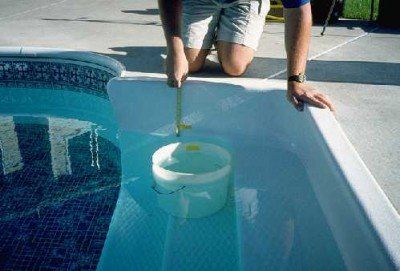Water Loss "Bucket Test"
in La Habra, CA
Bucket Test Procedure:
- Bring the pool water to its normal level
- Fill an empty bucket with pool water to about one inch from the top of bucket. (By filling the bucket close to the top you are ensuring that air movement over the surface of the bucket will similar to that of the pool.)
- Place the bucket on the first or second step of the pool. To keep it from floating away it may be necessary to place a few bricks or rocks into the bucket. (By placing the bucket in the pool water you are ensuring that the water temperature of each will be similar).
- Mark the water level inside the bucket.
- Mark the water level of the pool on the outside of the bucket, on the pool wall, or skimmer face plate.
- Operate the pool for 24 hours as it had been operated when a leak was first suspected.
- After 24 hours, compare the two levels. If the pool water (outside mark) goes down more than the inside water level, there is probably a leak.
Calculating the gallons of water lost from you pool
To more effectively visualize the leak or leaks you have it will be helpful to translate inches of water lost into gallons of water leaking. First subtract the bucket loss from the pool loss. The result will be inches of water lost due to leaks. Next calculate the square footage of the water surface of your pool. Then enter these results into the following equation:
Inches of water lost x Area of Pool Surface (in square feet) x .62 gallons
Visualizing the actual size of your leak is easier and as you can now translate this number into gallons of water lost per hour or per minute. You may also find it valuable to calculate how much you are spending on chemicals or for that matter water to re-treat or replace the water that has leaked from the pool.
ESTABLISHING SUSPECTED LEAK LOCATIONS WITH A “PUMP ON/PUMP OFF TEST”
Comparing the results of subsequent bucket tests with the pump on for 24 hours to the results with the pump off for 24 hours can provide additional information on the leak’s location.
Water loss pump on > water loss pump off = suspect return plumbing leaks (Pressure side plumbing)
Water loss pump on < water loss pump off = suspect skimmer/main drain plumbing leaks, (Suction side plumbing)
Water loss pump on = Water loss pump off = suspect shell, liner or fitting leaks, (non-plumbing)
Although these tests are prone to false results because of varying environmental conditions during the tests, the information they provide can at least establish suspect locations to begin your leak search. Giving this information to a leak professional will help them to efficiently solve your pool leak problem.

